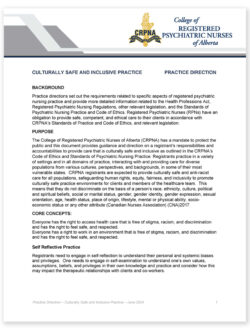CULTURALLY SAFE AND INCLUSIVE PRACTICE
Document Contents
Practice directions set out the requirements related to specific aspects of registered psychiatric nursing practice and provide more detailed information related to the Health Professions Act, Registered Psychiatric Nursing Regulations, other relevant legislation, and the Standards of Psychiatric Nursing Practice and Code of Ethics. Registered Psychiatric Nurses (RPNs) have an obligation to provide safe, competent, and ethical care to their clients in accordance with CRPNA’s Standards of Practice and Code of Ethics, and relevant legislation.
The College of Registered Psychiatric Nurses of Alberta (CRPNA) has a mandate to protect the public and this document provides guidance and direction on a registrant’s responsibilities and accountabilities to provide care that is culturally safe and inclusive as outlined in the CRPNA’s Code of Ethics and Standards of Psychiatric Nursing Practice. Registrants practice in a variety of settings and in all domains of practice, interacting with and providing care for diverse populations from various cultures, perspectives, and backgrounds, in some of their most vulnerable states. CRPNA registrants are expected to provide culturally safe and anti-racist care for all populations, safeguarding human rights, equity, fairness, and inclusivity to promote culturally safe practice environments for clients and members of the healthcare team. This means that they do not discriminate on the basis of a person’s race, ethnicity, culture, political and spiritual beliefs, social or marital status, gender, gender identity, gender expression, sexual orientation, age, health status, place of origin, lifestyle, mental or physical ability, socio-economic status or any other attribute (Canadian Nurses Association) (CNA) 2017.
Everyone has the right to access health care that is free of stigma, racism, and discrimination and has the right to feel safe, and respected.
Everyone has a right to work in an environment that is free of stigma, racism, and discrimination and has the right to feel safe, and respected.
Self Reflective Practice
Registrants need to engage in self-reflection to understand their personal and systemic biases and privileges. One needs to engage in self-examination to understand one’s own values, assumptions, beliefs, and privileges in their own knowledge and practice and consider how this may impact the therapeutic relationships with clients and co-workers.
Building Cultural Competence
Registrants need to undertake ongoing education to build skills and behaviours that help provide quality care to diverse populations. To assist in building upon self-awareness and to prevent limiting cultural competence to just a set of skills but building an awareness of cultural differences.
Registrants need to learn from the negative impacts of racism in the health care system and strive to action when observing others acting in a racist or discriminatory manner.
Registrants shall take reasonable steps to familiarize themselves with the current and historical injustices suffered by indigenous peoples prior to providing any psychiatric nursing services and ensure that all professional activities are performed in a culturally sensitive, safe, and competent practice.
Registrants shall respect the fundamental rights/dignity of all persons and peoples. Registrants shall not engage in and/or promote unjust discrimination that is prejudicial, directly, or indirectly against persons or peoples because of their culture, nationality, ethnicity, colour, race, religion, gender, gender expression, gender identity, marital status, sexual orientation, physical and/or mental abilities, age, socio-economic status, or any other status.
Registrants shall take into consideration the local and regional differences among multi-ethnic groups and recognize there are diverse patterns of values, religions, languages, and politics within these communities.
Registrants shall help colleagues to identify and eliminate racist attitudes, language, and behavior and support clients, colleagues, and others who experience and/or report acts of racism.
Registrants shall report acts of racism or discrimination through the appropriate channels and if necessary to the relevant health regulatory college.
Creating Safe Health Care Experiences
Registrants shall facilitate a safe, culturally competent health/mental health care experience for all clients to ensure that the client’s physical, mental/emotional, spiritual, and cultural needs are met.
Registrants shall acknowledge and incorporate into the client’s plan of care cultural rights, values, and practices, including ceremonies and protocols related to illness, birth, and death, where able.
Registrants shall work collaboratively with clients to meet the client’s health and wellness goals by providing clear information about the healthcare options available and about what the client may experience during the healthcare encounter.
Registrants must understand and recognize the impacts and root causes of historical intergenerational trauma and provide care based on trauma and violence-informed care approaches. Registrants need to focus on the resilience and strength each client brings to the healthcare encounter.
Cultural Humility: process of self-reflection to understand personal and systemic biases and privilege.
Cultural Competence: skills and behaviours that help a practitioner provide “quality care to diverse populations.”
- Can build upon self-awareness.
- Limited by reducing culture into a set of skills that practitioners can master and overemphasizing culture differences.
Cultural Awareness: acknowledgment of differences, focus on “other” and “other culture.”
Cultural Sensitivity: recognize the need to respect cultural differences and focus on the “other” and other culture.”
Cultural Safety: determined from the patient/community’s perspective, considers the social, political, and historical contexts, and requires practitioners to be self-reflective.
Anti-racism: reducing power differences between minority and dominant groups.
Trauma and Violence-Informed Care: recognize the impacts and root causes of historical intergenerational trauma.
British Columbia College of Nurses and Midwives – Practice Standard – Indigenous cultural safety, cultural humility, and anti-racism January 2022.
Chief Public Health Officer Health Professional Forum, Public Health Agency of Canada Common definitions on cultural safety, June 2023.
College of Alberta Psychologists Standards of Practice, May 2023.
College of Registered Nurses of Alberta – Culturally Safe and Inclusive Practice, June 2023
External Resources
Government of Alberta Inclusive Education
https://www.alberta.ca/inclusive-education.aspx
Government of Alberta Toolkit – Cultural Competency (Organizational Change Toolkit)
Truth and Reconciliation Commission of Canada: Call to Action
https://nctr.ca/about/history-of-the-trc/trc-website/
Government of Canada Guide on Equity, Diversity, and Inclusion Terminology
https://www.canada.ca/en/department-national-defence/maple-leaf/defence/2022/05/guide-equity-diversity-inclusion-terminology.html
Search our Library
Recent News
NEWS – Education Fund Moves
May 22, 2025Happy National Nursing Week 2025
May 12, 2025



